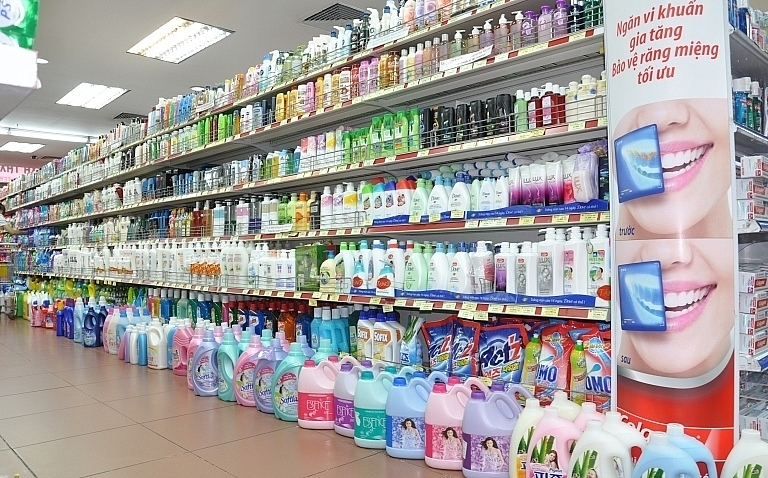Ngu A Chau falls to dominant foreign competitors
 |
| Leaving of Ngu A Chau shows the rise of foreign competitors in the domestic cosmetic sector |
The weakness of Vietnamese firms
Recently, Japan’s Takara Belmont Corporation announced to merge NAC into its business after acquiring a 97 per cent stake in the company.
Speaking at a press conference on the merger in Ho Chi Minh City on March 12, Nguyen Van Ngu, the founder of NAC said, “We built a methodical development plan, however, we lacked capital and faced difficulties in accessing loans from banks. Meanwhile, the firm has been pressed by competition with large-scale foreign firms. Thus, recognising that we will fail in this unbalanced race, we decided to sell the company to the Japanese partner.”
Established in 2006, NAC is known as one of the few domestic hair cosmetics manufacturers. NAC has a manufacturing plant in Tan Phu Trung Industrial Zone, in Ho Chi Minh City’s Cu Chi district. Its KNAC-brand products include hair dye, shampoo, hair mask, and hair wax. The product line makes up 10 per cent of the market and is distributed across 200 agencies and more than 35,000 hair salons nationwide.
| According to the results of a survey conducted by Kantar WorldPanel in four cities, including Hanoi, Ho Chi Minh City, Danang, Can Tho, and the rural areas, in 2017 the Vietnamese cosmetics market was dominated by a series of foreign enterprises, namely Unilever, P&G, Unicharm, Kimberly Clark, Colgate, and Palmolive. |
There have been numerous acquisitions made by foreign firms in the sector, including Marico and ICP, and Unicharm and Diana.
Notably, in 2011 Marico set foot in Vietnam by spending $60 million on acquiring an 85 per cent equity stake in International Consumer Products Corporation (ICP)—one of the most successful Vietnamese FMCG companies, which owns brands like X-Men, X-Men for Boss, and L'ovite.
At the time, the X-Men brand was a leading player in the male grooming segment in Vietnam, and was one of the most trusted personal care brands in the country.
It led the men's shampoo category with over 40 per cent market share and had extended its presence to other male grooming segments, such as deodorants and shower gels, where it held the top positions.
At the same year, Unicharm Corporation, through its subsidiary Uni-Charm (Thailand) Co., Ltd., completed the purchase of 95 per cent of the total outstanding common shares of Diana JSC, a leading Vietnamese hygiene product manufacturer and distributor. The deal’s value was $184 million.
Foreign giants rule the scene
According to the results of a survey conducted by Kantar WorldPanel in four cities, including Hanoi, Ho Chi Minh City, Danang, Can Tho, and the rural areas, in 2017 the Vietnamese cosmetics market was dominated by a series of foreign enterprises, namely Unilever, P&G, Unicharm, Kimberly Clark, Colgate, and Palmolive.
Especially, Unilever and P&G alone hold up to 80 per cent of the domestic detergent market, pocketing huge profits.
Unilever
During the past three years, Unilever remained in the top position in the health and beauty and homecare sectors in Vietnam. In 2017 Unilever remained the most chosen brand in the non-food sector, where international players hold over 80 per cent of the market share.
According to Nguyen Thi Bich Van, chairwoman of Unilever Vietnam, in the last year, Unilever’s business results were increasing in both urban and rural areas. Everyday, there are 35 million Vietnamese people using its products. Many of the company’s brands, including OMO, Lifebuoy, Sunsilk, Clear, Lipton, and Knorr, have become household names and have become an indispensable part of people’s lives.
Entering Vietnam in 1995, to date, Unilever has invested more than $300 million to develop two factories in Ho Chi Minh City and Bac Ninh province. At present, it has a network of 150 distributors and 300,000 retail agencies.
P&G
Entering Vietnam in 1995, Procter & Gamble (P&G) is one of the first US groups to invest in Vietnam.
P&G Vietnam is one of the top two FMCG manufacturers in the Vietnamese market. It is ranking either the first or second across different categories, such as razor blades, hair care, laundry, and baby care. It has brought 14 world trusted quality brands into Vietnam, including Ariel, Downy, Tide, Pampers, Gillette, Pantene, and Head & Shoulders, touching the daily needs of 19 million Vietnamese households.
During the 15 years from 2000 to 2015, P&G Vietnam achieved a strong average growth rate in the high double digits.
In April 2015, the company organised the groundbreaking ceremony for the $100-million Gillette production factory in Binh Duong, which is part of P&G’s long-term investment plan in Vietnam.
The factory is P&G’s third in Vietnam, bringing the firm’s total investment capital in Vietnam to $360 million.
Along with Unilever and P&G, other names holding large market shares in the health and beauty and homecare sectors are Unicharm, Kimberly Clark, Colgate Palmolive, and Unza.
What the stars mean:
★ Poor ★ ★ Promising ★★★ Good ★★★★ Very good ★★★★★ Exceptional
Related Contents
Latest News
More News
- NAB Innovation Centre underscores Vietnam’s appeal for tech investment (January 30, 2026 | 11:16)
- Vietnam moves towards market-based fuel management with E10 rollout (January 30, 2026 | 11:10)
- Vietnam startup funding enters a period of capital reset (January 30, 2026 | 11:06)
- Vietnam strengthens public debt management with World Bank and IMF (January 30, 2026 | 11:00)
- PM inspects APEC 2027 project progress in An Giang province (January 29, 2026 | 09:00)
- Vietnam among the world’s top 15 trading nations (January 28, 2026 | 17:12)
- Vietnam accelerates preparations for arbitration centre linked to new financial hub (January 28, 2026 | 17:09)
- Vietnam's IPO market on recovery trajectory (January 28, 2026 | 17:04)
- Digital economy takes centre stage in Vietnam’s new growth model (January 28, 2026 | 11:43)
- EU Council president to visit Vietnam amid partnership upgrade (January 28, 2026 | 11:00)

 Tag:
Tag:























 Mobile Version
Mobile Version